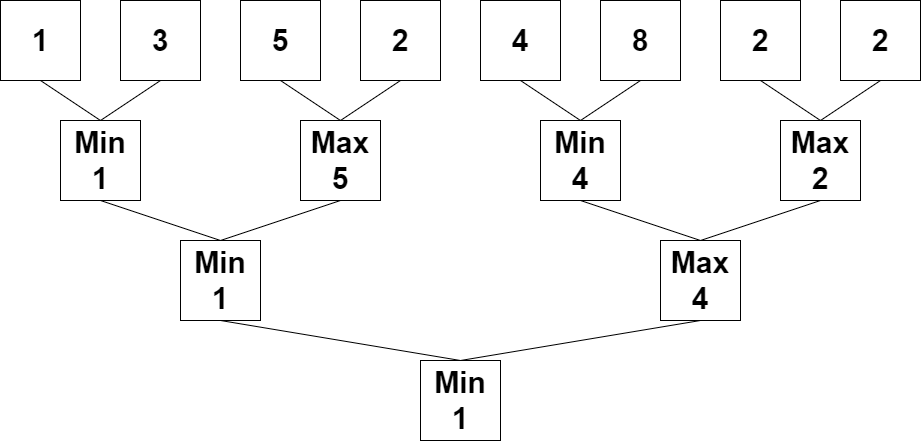You are given a 0-indexed integer array nums whose length is a power of 2.
Apply the following algorithm on nums:
- Let
nbe the length ofnums. Ifn == 1, end the process. Otherwise, create a new 0-indexed integer arraynewNumsof lengthn / 2. - For every even index
iwhere0 <= i < n / 2, assign the value ofnewNums[i]asmin(nums[2 * i], nums[2 * i + 1]). - For every odd index
iwhere0 <= i < n / 2, assign the value ofnewNums[i]asmax(nums[2 * i], nums[2 * i + 1]). - Replace the array
numswithnewNums. - Repeat the entire process starting from step 1.
Return the last number that remains in nums after applying the algorithm.
Example 1:
Input: nums = [1,3,5,2,4,8,2,2] Output: 1 Explanation: The following arrays are the results of applying the algorithm repeatedly. First: nums = [1,5,4,2] Second: nums = [1,4] Third: nums = [1] 1 is the last remaining number, so we return 1.
Example 2:
Input: nums = [3] Output: 3 Explanation: 3 is already the last remaining number, so we return 3.
Constraints:
1 <= nums.length <= 10241 <= nums[i] <= 109nums.lengthis a power of2.
class Solution:
def minMaxGame(self, nums: List[int]) -> int:
n = len(nums)
if n == 1:
return nums[0]
t = []
for i in range(n >> 1):
v = max(nums[i << 1], nums[i << 1 | 1]) if i & 1 else min(
nums[i << 1], nums[i << 1 | 1])
t.append(v)
return self.minMaxGame(t)class Solution {
public int minMaxGame(int[] nums) {
int n = nums.length;
if (n == 1) {
return nums[0];
}
int[] t = new int[n >> 1];
for (int i = 0; i < t.length; ++i) {
int a = nums[i << 1], b = nums[i << 1 | 1];
t[i] = (i & 1) == 1 ? Math.max(a, b) : Math.min(a, b);
}
return minMaxGame(t);
}
}class Solution {
public:
int minMaxGame(vector<int>& nums) {
int n = nums.size();
if (n == 1) return nums[0];
vector<int> t(n >> 1);
for (int i = 0; i < t.size(); ++i)
{
int a = nums[i << 1], b = nums[i << 1 | 1];
t[i] = (i & 1) == 1 ? max(a, b) : min(a, b);
}
return minMaxGame(t);
}
};func minMaxGame(nums []int) int {
n := len(nums)
if n == 1 {
return nums[0]
}
var t []int
for i := 0; i < n>>1; i++ {
a, b := nums[i<<1], nums[i<<1|1]
if (i & 1) == 1 {
t = append(t, max(a, b))
} else {
t = append(t, min(a, b))
}
}
return minMaxGame(t)
}
func max(a, b int) int {
if a > b {
return a
}
return b
}
func min(a, b int) int {
if a < b {
return a
}
return b
}function minMaxGame(nums: number[]): number {
while(nums.length > 1) {
let n = nums.length;
let tmp = [];
for (let i = 0; i < n; i += 2) {
if (i % 4 == 2) {
tmp.push(Math.max(nums[i], nums[i + 1]));
} else {
tmp.push(Math.min(nums[i], nums[i + 1]));
}
}
nums = tmp;
}
return nums[0];
};
